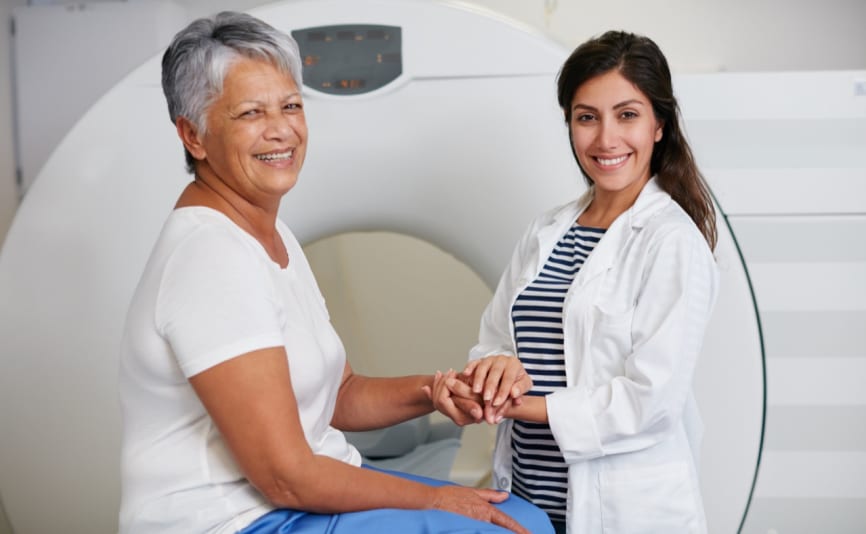Magnetic Resonance Imaging (MRI) scans are a powerful diagnostic tool used in the medical field. They generate detailed images of the body's internal organs and structures, to help radiologists and clinicians identify any anomalies and diagnose potential health conditions and diseases.
One of the most important areas that MRI scans can image is the liver. Liver MRI scans are non-invasive and can provide key information about the health of the liver.
In this guide, we will explore the process of a liver MRI scan, the symptoms and conditions it can identify, the advantages of liver MRI scans, and the safety considerations that must be taken into account.
How Do Liver MRI Scans Work?
A liver MRI scan is a non-invasive diagnostic test that uses a powerful magnetic field and radio waves to produce detailed images of the liver.
During the scan, a patient lies on a table that is moved into a large cylinder-shaped machine called an MRI scanner. The scanner emits a magnetic field, which causes the hydrogen atoms in the liver to produce a signal that is picked up by the scanner. This signal is then used to create detailed images of the liver.
Contrast agents are sometimes used in liver MRI scans to help better visualise specific structures or blood vessels. The contrast agent is typically given via injection or IV, and can be either before or during the procedure. It travels to the liver, where it highlights specific areas of interest in the images created during the scan.
Symptoms and Conditions a Liver MRI Scan Can Identify
A liver MRI scan can be used to identify and diagnose a wide range of conditions associated with the liver. Some of the most common include:
- Liver disease, such as cirrhosis or fatty liver disease
- Tumours, including liver cancer
- Abnormalities in the blood vessels that supply the liver, such as blockages or narrowing
- Inflammation or infection of the liver
- Damage to the liver caused by alcohol or other toxins
Liver MRI scans can also be used to monitor the progression of liver disease and to assess the effectiveness of treatment.
You might hear the word ‘hepatic’ used when describing your scan or results, such as hepatic function, hepatic disease, or hepatic cells. This word is used to describe anything related to the liver, and is often referenced in medical research or in the discussion of liver-related conditions, like liver cancer or cirrhosis.
Advantages of Liver MRI Scans
One of the biggest advantages of liver MRI scans is their precision and accuracy. MRI scans generally have a higher level of soft tissue contrast, which allows for more detailed images of the liver and surrounding structures. This makes it possible to detect even small abnormalities in the liver.
Unlike other imaging tests, such as X-rays or CT scans, MRI scans do not use ionising radiation, which reduces the risk of the side effects of too much radiation exposure. This means they can be repeated more often for monitoring purposes.
Another advantage of liver MRI scans is that they are non-invasive. This means that there is no need for incisions, and even if a contrast injection is required, it is a common procedure with no significant discomfort and side effects are generally uncommon or mild.
Safety Considerations for Liver MRI Scans
While liver MRI scans are generally considered safe, there are some safety considerations that must be taken into account.
People with certain types of metal in their bodies, such as pacemakers or cochlear implants, may not be able to undergo an MRI scan. This is because the scanner's magnetic field may interact with devices, or other metal objects in the body such as shrapnel or piercings. It is important to tell your doctor and radiographer before your scan if you have any implanted medical devices or metal in your body.
It's also important to tell your clinician if you're pregnant or breastfeeding, or if you have a history of kidney problems, as this might affect your suitability for having a contrast agent administered. The contrast material is removed from the body by the kidneys naturally, but people with kidney problems may be at a higher risk of complications.
Conclusion
Liver MRI scans are a powerful diagnostic tool that can provide important information about the health of the liver. They are non-invasive, accurate, and safe, and can identify a wide range of symptoms and conditions.
Next Steps
- If you're looking for a liver MRI scan, you can search for nearby locations, compare prices, and book now via our homepage.
- Not sure if your symptoms are liver-related? Check out our liver body area page to find out if a liver MRI is right for you.
Sources Used
- https://www.healthline.com/health/mri-liver
- https://www.cancerresearchuk.org/about-cancer/liver-cancer/getting-diagnosed/tests/mri-scan
- https://www.ncbi.nlm.nih.gov/pmc/articles/PMC5901158/
- https://www.msdmanuals.com/en-gb/home/liver-and-gallbladder-disorders/blood-vessel-disorders-of-the-liver/overview-of-blood-vessel-disorders-of-the-liver






